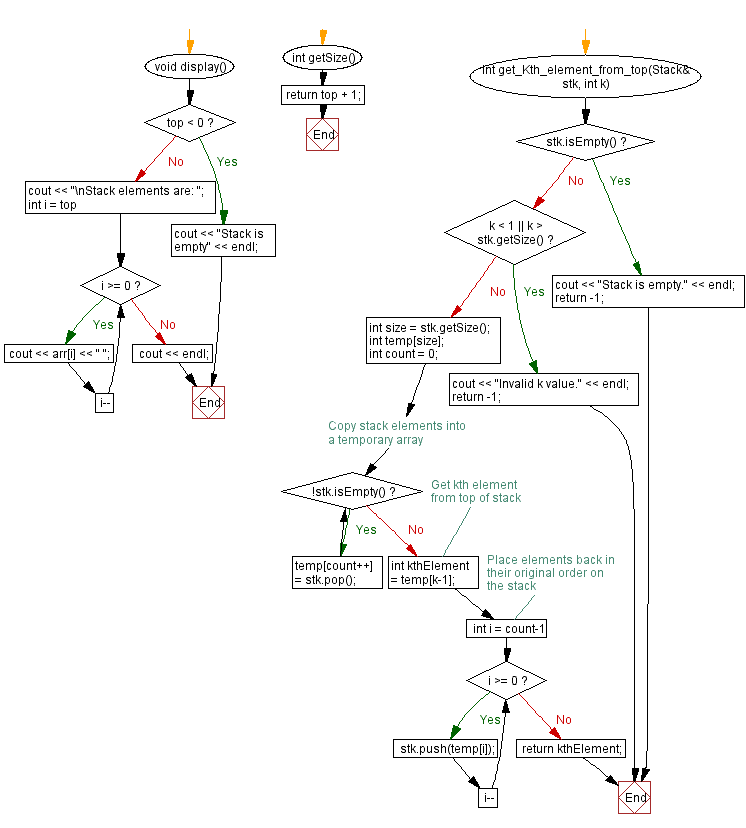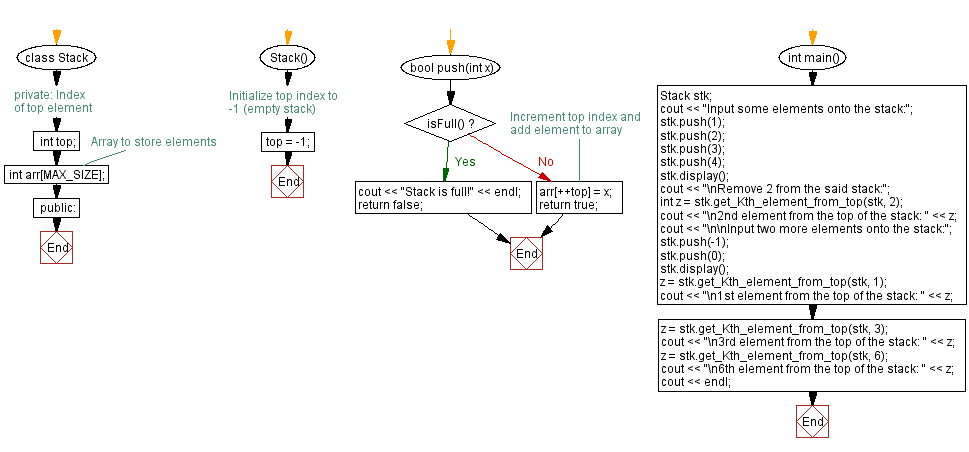C++ Stack Exercises: Kth element of a stack from top position
14. Get the Kth Element from the Top of an Array-Based Stack
Write a C++ program to get the Kth element of a stack from top position.
Test Data:
Input some elements onto the stack:
Stack elements are: 4 3 2 1
Remove 2 from the said stack:
2nd element from the top of the stack: 3
Sample Solution:
C++ Code:
#include <iostream>
using namespace std;
#define MAX_SIZE 15 // Maximum size of stack
class Stack {
private:
int top; // Index of top element
int arr[MAX_SIZE]; // Array to store elements
public:
Stack() {
top = -1; // Initialize top index to -1 (empty stack)
}
bool push(int x) {
if (isFull()) {
cout << "Stack is full!" << endl; // Display message if stack is full
return false; // Return false to indicate failure in pushing element
}
// Increment top index and add element to array
arr[++top] = x;
return true; // Return true to indicate successful element addition
}
int pop() {
if (isEmpty()) {
cout << "Stack underflow" << endl; // Display message if stack is empty
return 0; // Return 0 to indicate failure in popping element
}
// Return top element and decrement top index
return arr[top--];
}
int peek() {
if (isEmpty()) {
cout << "Stack is empty" << endl; // Display message if stack is empty
return 0; // Return 0 to indicate failure in peeking element
}
// Return top element without modifying top index
return arr[top];
}
bool isEmpty() {
// Stack is empty if top index is -1
return (top < 0);
}
bool isFull() {
// Stack is full if top index is equal to MAX_SIZE - 1
return (top >= MAX_SIZE - 1);
}
void display() {
if (top < 0) {
cout << "Stack is empty" << endl; // Display message if stack is empty
return;
}
cout << "\nStack elements are: ";
for (int i = top; i >= 0; i--)
cout << arr[i] << " "; // Display elements of the stack
cout << endl;
}
int getSize() {
return top + 1; // Return the size of the stack
}
int get_Kth_element_from_top(Stack& stk, int k) {
if (stk.isEmpty()) {
cout << "Stack is empty." << endl; // Display message if the stack is empty
return -1;
}
if (k < 1 || k > stk.getSize()) {
cout << "Invalid k value." << endl; // Display message for invalid k value
return -1;
}
int size = stk.getSize();
int temp[size];
int count = 0;
// Copy stack elements into a temporary array
while (!stk.isEmpty()) {
temp[count++] = stk.pop();
}
// Get kth element from top of stack
int kthElement = temp[k - 1];
// Place elements back in their original order on the stack
for (int i = count - 1; i >= 0; i--) {
stk.push(temp[i]);
}
return kthElement; // Return the kth element from the top of the stack
}
};
int main() {
Stack stk;
cout << "Input some elements onto the stack:";
stk.push(1);
stk.push(2);
stk.push(3);
stk.push(4);
stk.display();
cout << "\nRemove 2 from the said stack:";
int z = stk.get_Kth_element_from_top(stk, 2); // Get the 2nd element from the top of the stack
cout << "\n2nd element from the top of the stack: " << z;
cout << "\n\nInput two more elements onto the stack:";
stk.push(-1);
stk.push(0);
stk.display();
z = stk.get_Kth_element_from_top(stk, 1); // Get the 1st element from the top of the stack
cout << "\n1st element from the top of the stack: " << z;
z = stk.get_Kth_element_from_top(stk, 3); // Get the 3rd element from the top of the stack
cout << "\n3rd element from the top of the stack: " << z;
z = stk.get_Kth_element_from_top(stk, 6); // Get the 6th element from the top of the stack
cout << "\n6th element from the top of the stack: " << z;
cout << endl;
}
Sample Output:
Input some elements onto the stack: Stack elements are: 4 3 2 1 Remove 2 from the said stack: 2nd element from the top of the stack: 3 Input two more elements onto the stack: Stack elements are: 0 -1 4 3 2 1 1st element from the top of the stack: 0 3rd element from the top of the stack: 4 6th element from the top of the stack: 1
Flowchart:


For more Practice: Solve these Related Problems:
- Write a C++ program to retrieve the kth element from the top in an array-based stack with bounds checking.
- Develop a C++ program that calculates the kth position in an array-based stack and prints the corresponding element.
- Design a C++ program to fetch the kth element from an array-based stack and handle invalid k values gracefully.
- Implement a C++ program to access the kth item in a stack (using an array) and output its value without altering the stack.
Go to:
PREV : Delete All Occurrences of an Item in an Array-Based Stack.
NEXT : Replace the Kth Element in an Array-Based Stack with a New Value.
CPP Code Editor:
Contribute your code and comments through Disqus.
What is the difficulty level of this exercise?
